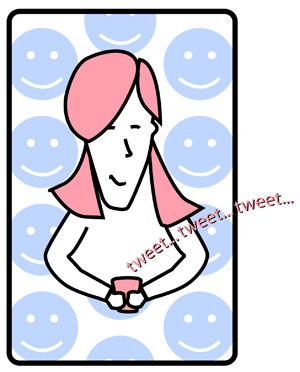 The micro-blogging service Twitter seems to be more than just another trendy tool. For many, it provides constant connection to the outside world, and quite literally, a community in your pocket.
The micro-blogging service Twitter seems to be more than just another trendy tool. For many, it provides constant connection to the outside world, and quite literally, a community in your pocket.
In many ways, it is the ultimate reporting tool. You can send quick updates to trusted friends, individuals, or the web at large, using a simple device. The community reacts immediately, asking questions and sharing more information.
If you are unfamiliar with micro-blogging, Mark Glaser offers a concise description:
“Micro-blogging allows you to write brief text updates about your life on the go, and send them to friends and interested observers via text messaging, instant messaging, email or the web.”
Let’s take a look at a few of its uses.
Shel Israel reflects on Twitter’s effect in reporting news:
“We are all part of the news network now. Twitter makes it a bigger faster network. But social media, time and time again is showing it’s value when dramatic and fast-moving news breaks.”
Dennis Howlett talks about the business utility of Twitter:
“When Hurricane Katrina struck, great weight was given to the speed with which the blogs swung into action. Twitter is proving far quicker at relaying reaction. This has huge implications for business.”
“World events can disrupt markets, impact buying decisions, affect entire economies. If the speed at which we are now being bombarded with news is literally in the moment, then enterprises will need to have appropriate process response mechanisms in place. I’m not convinced those exist.”
Amy Gahran adds that blogs and micro-blogs are the best way to stay on top of news in media-restricted countries, like Pakistan. It serves as a must-have utility:
“The key value to keep in mind about Twitter: Since it’s mobile-friendly for posting and receiving, and since it just works, it’s proven exceptionally useful during crises.”
Twitter also offers emotional value:
- Personal expression.
“For me, the main reason I use social media tools is they allow me to express my natural urge to share and connect. I’m actually a fairly social person. I enjoy feeling connected, feeling useful, and interacting with people. That has always been fun for me. I guess it provides a sense of belonging and validation — but based on authenticity rather than conformity. (I always sucked at conforming.)” - A helping hand.
“Social media tools also provide me with a sense of relief, to have a community available that’s a source of inspiration, energy, and connection. It’s becoming a valued resource. I no longer feel like I have to do everything myself. I can see more clearly that I am but part of a greater whole, and that takes a lot pressure off.” - Personal connections.
“Twitter is the only one that supplies me with a steady stream of engaging but manageable feedback that feels (and is) personal — and therefore matters more. Basically, when I post something interesting or thoughtful to Twitter, I’m rewarded by getting responses (not all the time, but often enough). I don’t get that sense of engagement through the other services I use.”
These thoughts are mirrored by one Twitter’s post after the service was down for several hours:
“Whoa, that extended Twitdrawal underscored the glaring lack of community I feel in real-life.”
Dan York shares the 10 ways he uses Twitter:
- Twitter as a News Source
- Twitter as a Knowledge Network
- Twitter as a Virtual Water Cooler
- Twitter as a way to stay up-to-date with friends
- Twitter as a Travelogue
- Twitter to Track Conferences
- Twitter as a PR/marketing Tool
- Twitter as a Learning Tool
- Twitter as Fun
- Twitter as a Daily Lesson in Humility (and Brevity)
Of course, it’s not all serious. Lou Cabron has ideas for a celebrity-driven Twitter world:
“Envisioning the rise of Twitter consultants creating fake updates for Hollywood clientele. Imagining Paris Hilton junkies loving Twitter. Because of the illusion that they’re stalking her.”
It’s not hard to see how for a reporter, “covering” an event can become an immediate event within itself – with readers asking questions, adding information, and helping to lead the direction of the coverage. Robert Scoble has experimented with this when he attends exclusive press conferences: he will ask questions that people send him via Twitter.
Perhaps it’s not just about “conversations.” It is also about access – connections to people and events that would otherwise be unavailable. For a journalist – this is an amazing opportunity.
